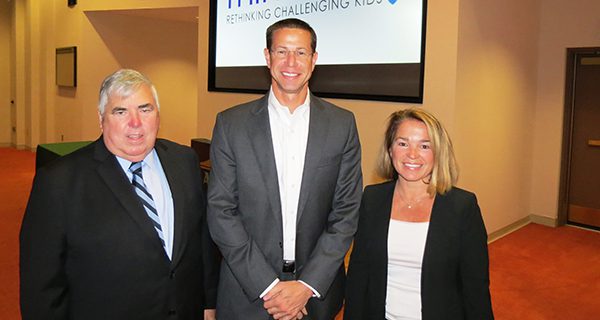[ccfic caption-text format="plaintext"]
Nationally acclaimed speaker and author Dr. J. Stuart Ablon, a Psychologist at Massachusetts General Hospital, was the guest of Norfolk District Attorney Michael W. Morrissey at an all-day training to help school districts deal with and find durable solutions to the most challenging and disruptive behaviors.
“The year after New York Police began training their school safety officers in Dr. Ablon’s ‘Think:Kids’ Collaborative Problem Solving model in 2013, there was a 58 percent decrease in arrests made at school and 20 percent decrease in the reports of major crimes,” District Attorney Morrissey said. “Norfolk County schools may have different issues than any metropolis, but the solutions he offers work across demographics.”
More than 110 educators, school nurses, psychologists and adjustment counselors – including 40 school resource officers – took part in the September 20 event, including Westwood School Psychologists Kristine McDonald, Whitney Kimball and Melissa Berkowitz as well as Police Sgt. Joseph Vinci and School Resource Officer Brad Pindel.
“Dr. Ablon’s methods are simple, but not easy. They start from the premise, rooted in research, that most kids ‘do well if they can,’” Morrissey said. “When they act out in school, the adults around them can be trained to work with them to identify, then teach the skills they need to succeed.”
The “Think: Kids” method is the opposite of permissiveness, but also avoids ineffective punishment models, Morrissey said. Instead, educators and school resource officers are trained in Collaborative Problem Solving – meaning the students are strategically engaged in coming up with resolutions to the conflict. In doing so, they improve skills that will prevent the problem from recurring.
“The new criminal justice reform act changes the role of school resource officers, removing them from enforcing school rules and discipline,” District Attorney Morrissey said. “Our training today provides information on research-based interventions being used across the country to address challenging student behavior without resorting to police powers or punitive steps.”
The research shows that collaborative problem solving creates more durable solutions to problematic behavior than either permissiveness or punitive action, and the District Attorney also sees benefits for the students as they age into adulthood.
“Helping students overcome poor impulse control, inability to manage irritability or disappointment, or help them learn to manage conflict – all while still in the safe environment of a school – can only help their future,” Morrissey said. “Spend a morning in any district courtroom and you will see petty assaults, property destruction and other crimes that arise from the same skill deficits.”


























